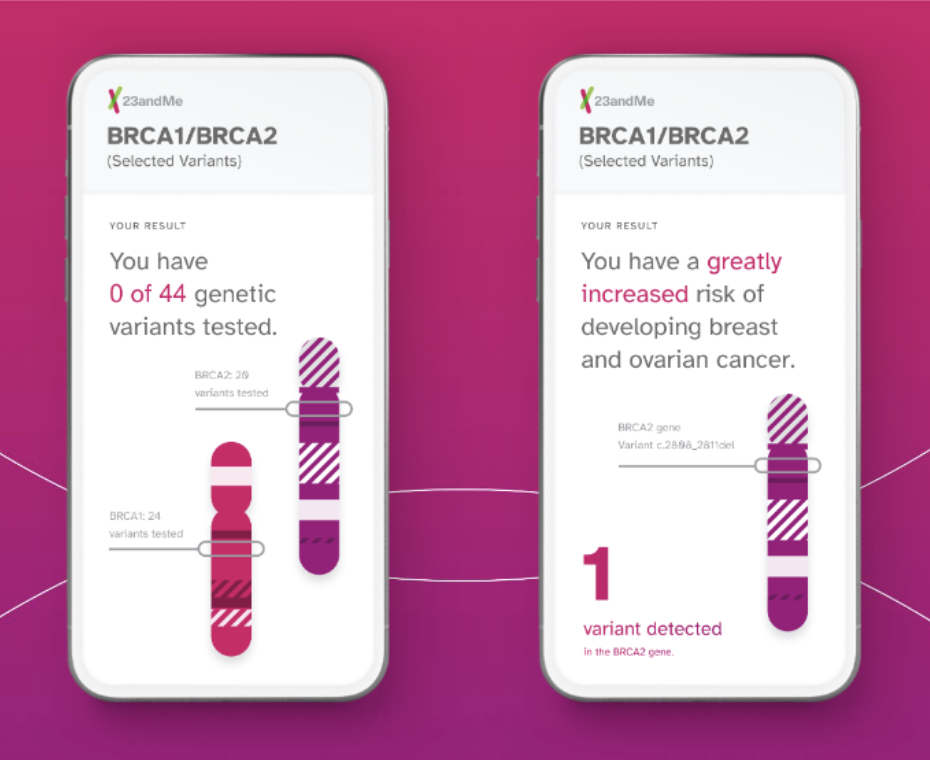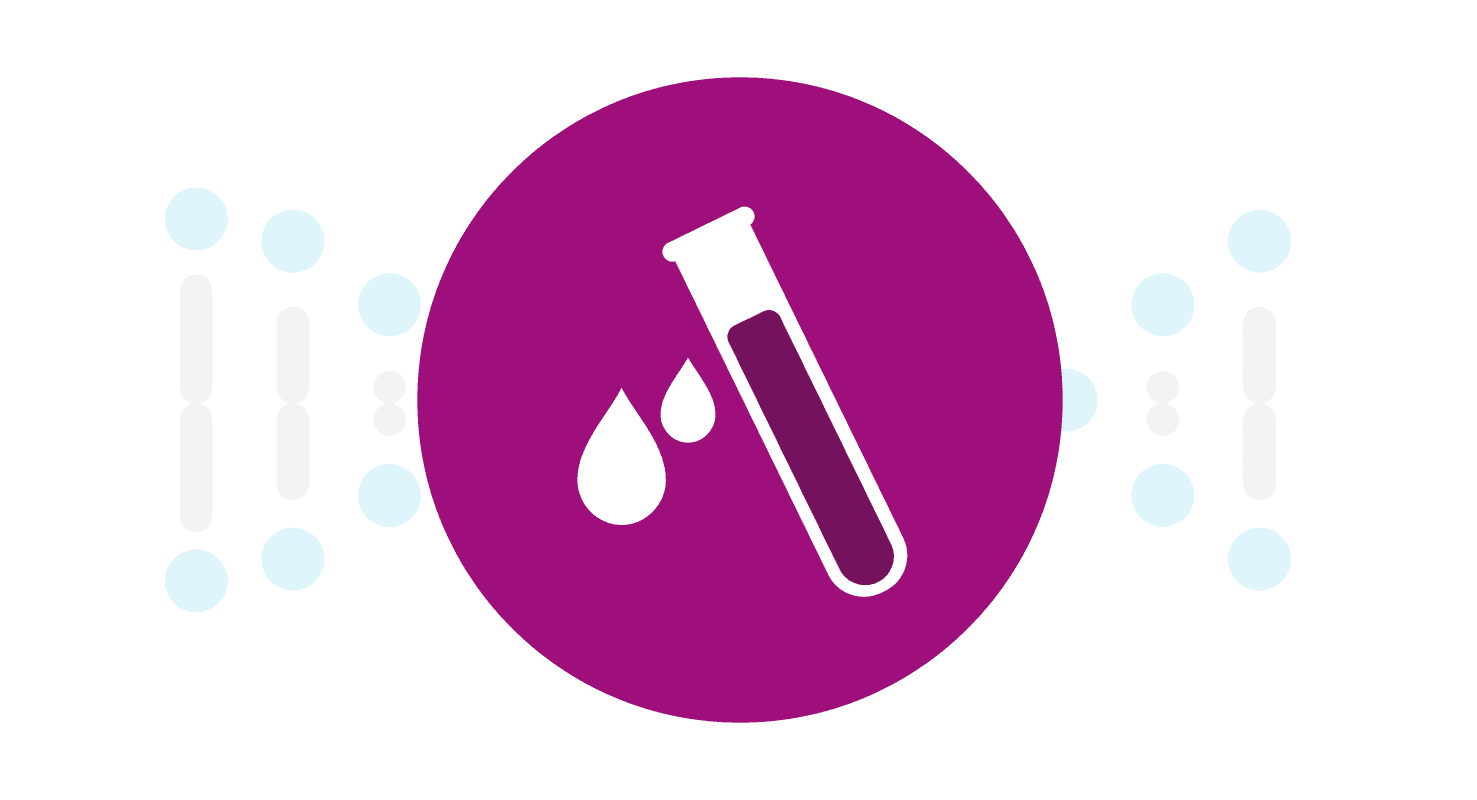Sarah opened her 23andMe report and immediately understood that this was serious.
“I knew it was something I had to take action about right away, and that’s what I did,” she said.
On a Whim
The Bay Area mother of two young children with a thriving career in tech, said she isn’t really sure what prompted her to buy a 23andMe kit for herself and her husband.
“I’m not an overly ‘woo woo’ person, but I can’t explain it,” she said. “I knew about 23andMe, and that it was popular, but I can’t explain exactly why I felt so strongly about ordering it.”
It’s lucky she did.
BRCA1/BRCA2 (Selected Variants) Genetic Health Risk Report
Of course, Sarah was curious about what she’d learn from exploring her DNA, but she didn’t go into the experience looking for a specific insight. She just felt she needed to order it, so she did. The kits arrived in the mail and she and her husband sent off their samples to the lab. A couple of weeks later she got a message in the 23andMe app letting her know her reports were in.
She opted in to view her Health reports, went through a short tutorial then opened her BRCA1/BRCA2 (Selected Variants) Genetic Health Risk Report.*
Right away, Sarah saw the test detected a variant in the BRCA2 gene that put her at higher risk for breast and ovarian cancer. She was stunned. Cancer didn’t run in her family, or at least not that she knew. Her paternal grandparents, both Holocaust survivors, lived long, healthy lives. And she was both fit and healthy herself.
“I knew it wasn’t good,” Sarah said.
This is Serious
We’re sharing Sarah’s story as part of Breast Cancer Awareness Month. Throughout the month of October we’ll be highlighting how 23andMe has helped flagged a risk for those who might not have otherwise learned that they carried a risk variant. Indeed, most people with a BRCA1 or BRCA2 risk variant don’t know they have one, according to a 2018 study by researchers at Geisinger Health in Pennsylvania.
Like many others, Sarah had no idea she had a risk variant until after she received her 23andMe report. But she’d opened her report just an hour before a birthday party in her honor, so she waited to process the newly received information. About a week later, at the end of an already scheduled annual physical with her general practitioner, she showed her doctor her 23andMe report.
“He said it was serious and told me he was referring me to the Hereditary Cancer Clinic at UCSF,” Sarah said.
Taking Action
In quick succession, she saw a genetic counselor, was tested at the clinic to confirm that she did indeed carry the variant 23andMe detected, and began meeting with BRCA specialists. Their first recommendation was that she preventatively remove her fallopian tubes and ovaries to completely avoid future cancer risk to those organs. She acted fast, but after that first surgery she wasn’t yet ready for a preventative mastectomy, and instead elected to get a mammogram and MRI twice a year as part of a high risk breast cancer screening protocol, one that she wouldn’t have qualified for without her recent BRCA discovery given her cancer-free family history. But in November of 2022, about a year after first testing with 23andMe, her MRI came back abnormal. A biopsy showed that she had early-stage breast cancer in both breasts.
“I was shocked, but I went into action mode,” Sarah said.
Knowledge is Power
Her doctors recommended she have a double mastectomy, and Sarah agreed and acted quickly. A month later she had surgery including the removal of lymph nodes on each side to test for the spread of any cancer cells outside her breast tissue. When the pathology on her removed breast tissue and nodes came back, Sarah received great news: her lymph nodes were clear and the cancer hadn’t spread. Her bilateral breast cancers had both been extremely small and caught incredibly early. As a result, Sarah didn’t need any post-surgical chemotherapy or radiation, and less than a year since her cancer diagnosis she is back to living her normal, vibrant life.
Sarah said that because of the size and type of cancers, its likely they wouldn’t have been discovered by a regular annual mammogram for many years.Thankfully, due to her high risk status as a BRCA carrier, she was able to get regular MRI’s which lead to early detection. Sarah believes that if she hadn’t gotten tested through 23andMe, she might not have discovered the cancers until many years later, and by then it may have been too late to successfully treat.
“I really believe 23andMe saved my life,” said Sarah. “If I never received that information I don’t know if I’d be sitting here in a couple of years…knowledge is power and whatever you learn you can act on … so empower yourself and take the test.”
23andMe’s BRCA1/BRCA2 (Selected Variants) Genetic Health Risk Report originally looked at three variants in those genes that are most common in people of Ashkenazi Jewish descent. In August, 23andMe received FDA authorization to add another 41 variants to its report.** Now the report looks at 44 variants. Many of these additional variants are most common in people with African American, Latino, or Asian ancestry. More than 20,000 23andMe customers have one of the variants that will be included in the updated report.

23andMe Health + Ancestry Service customers tested on our latest genotyping chip have access to the expanded report.
Existing customers can view their report here. Not yet a customer? You can find out all that 23andMe has to offer here.
Important Test Information:
The 23andMe PGS test uses qualitative genotyping to detect select clinically relevant variants in the genomic DNA of adults from saliva for the purpose of reporting and interpreting genetic health risks, including the 23andMe PGS Genetic Health Risk Report for BRCA1/BRCA2 (Selected Variants). Your ethnicity may affect the relevance of each report and how your genetic health risk results are interpreted. The test is not intended to diagnose any disease and does not describe a person’s overall risk of developing any type of cancer. It is not intended to tell you anything about your current state of health, or to be used to make medical decisions, including whether or not you should take a medication, how much of a medication you should take, or determine any treatments.
Warnings & Limitations:
The 23andMe PGS Genetic Health RIsk Report for BRCA1/BRCA2 (Selected Variants) is indicated for reporting of the 185delAG and 5382insC variants in the BRCA1 gene and the 6174delT variant in the BRCA2 gene. The report describes if a woman is at increased risk of developing breast and ovarian cancer, and if a man is at increased risk of developing breast cancer or may be at increased risk of developing prostate cancer. The three variants included in this report are most common in people of Ashkenazi Jewish descent and do not represent the majority of BRCA1/BRCA2 variants in the general population. This report does not include variants in other genes linked to hereditary cancers and the absence of variants included in this report does not rule out the presence of other genetic variants that may impact cancer risk. The PGS test is not a substitute for visits to a healthcare professional for recommended screenings or appropriate follow-up. Results should be confirmed in a clinical setting before taking any medical action.
Important Test Information for Updated Report:
**The 23andMe PGS test uses qualitative genotyping to detect select clinically relevant variants in the genomic DNA of adults from saliva for the purpose of reporting and interpreting genetic health risks, including the 23andMe PGS Genetic Health Risk Report for BRCA1/BRCA2 (Selected Variants). Your ethnicity may affect the relevance of each report and how your genetic health risk results are interpreted. The test is not intended to diagnose any disease and does not describe a person’s overall risk of developing any type of cancer. It is not intended to tell you anything about your current state of health, or to be used to make medical decisions, including whether or not you should take a medication, how much of a medication you should take, or determine any treatments.
Warnings & Limitations:
The 23andMe PGS Genetic Health Risk Report for BRCA1/BRCA2 (Selected Variants) is indicated for reporting of 44 variants in the BRCA1 and BRCA2 genes. The report describes if a person’s genetic result is associated with an increased risk of developing breast cancer and ovarian cancer and may be associated with an increased risk for prostate cancer, pancreatic cancer, and potentially other cancers. The variants included in this report do not represent the majority of the BRCA1/BRCA2 variants in people of most ethnicities. This report does not include variants in other genes linked to hereditary cancers and the absence of variants included in this report does not rule out the presence of other genetic variants that may impact cancer risk. This report is for over-the-counter use by adults over the age of 18, and provides genetic information to inform discussions with a healthcare professional. The PGS test is not a substitute for visits to a healthcare professional for recommended screenings or appropriate follow-up. Results should be confirmed by an independent genetic test prescribed by your own healthcare provider before taking any medical action.




